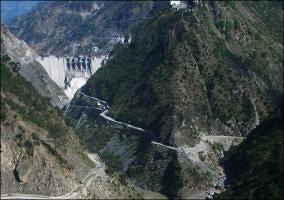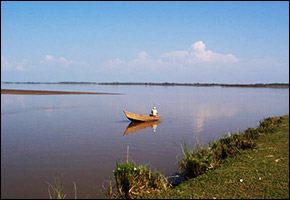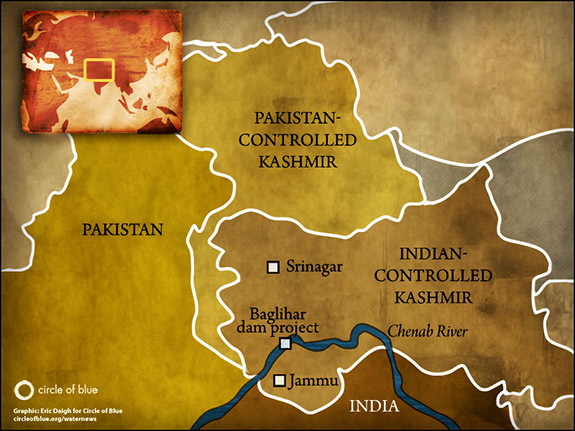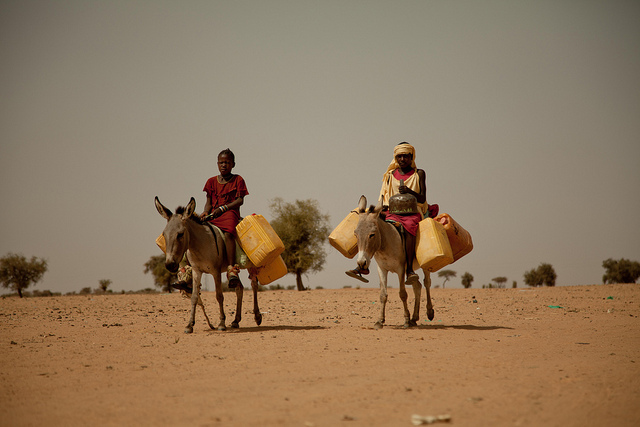U.S. needs integrated international water strategy to avert conflict, foster cooperation, says new CSIS report

Global conflicts over water threaten geopolitical stability; ‘”water ambassador” should head new bureau on water policy in Washington, think tank says
by C.T. Pope
Circle of Blue
Conflict in Kashmir ebbs and flows, especially as India’s crucial Baglihar Dam reservoir surges with water that may not be its own. With the rising levels, come rising tensions between Islamabad and New Delhi. The 450 mega-watt dam, near the Pakistan-India border along Kashmir’s Chenab River, promises to bring hydroelectric power to northern Indian. But as the dam reaches full capacity, Islamabad is crying foul and seeking compensation for what it views as a “gross violation” of international treaty and “stolen” water.
International conflict over water isn’t new. But as water shortages continue to threaten the stability of politically fragile regions — like Kashmir — U.S. policy toward international water management grows more important. That’s according to a new report released today by the Center for Strategic and International Studies (CSIS), a Washington-based bipartisan think-tank.
“The management of water resources can be a catalyst for cross-border cooperation or a trigger for socio-economic instability, especially as relentless demographic and environmental pressures constrain the choices available to future leaders,” Erik Peterson, senior vice president of CSIS, told Circle of Blue. “Instability abroad can and does affect the United States negatively, and as a result there is a compelling case for the implementation of a far-reaching U.S. international water policy in the short term.”
With the world facing greater and greater demands on water resources — due to increased energy needs, population growth, and climate change — experts must work with legislators to develop a clear and integrated international U.S. water policy, policy analysts say.
“We need a much more significant emphasis on global water issues across the policy making process,” Peterson said, “and we need to allocate much more significant resources to making water a key component to the way we conduct policy in the world.”
To that end, the report calls for the creation of a new Bureau for International Water Policy within the U.S. Department of State. The office would inform U.S. policy on global water issues, and offer suggestions to USAID. Headed by a “U.S. ambassador on water,” the bureau would advise U.S. geopolitical water conflict policy.
Water complicates relations in Kashmir
Water has always played a major role in India and Pakistan’s relations. Sharing six transnational rivers near the Kashmir region, water management has served as both a point of conflict and a point of cooperation between the two nations in the past.
At the heart of the present clash over the Baglihar Dam project, stands the Indus Waters Treaty — an agreement dating back nearly 60 years. The treaty equally divides the water resources of the nations’ six shared rivers; effectively giving three rivers to Pakistan — including the Chenab on which the Baglihar is built — and three to India. And while the treaty requires the World Bank to arbitrate, U.S. interests in the region are invariably tied to the outcome of any negotiations. U.S. efforts in the war on terror continue to depend on the stability of the Kashmir region, leading U.S. policy analysts say.
It remains unclear when and if Pakistan will bring its newest grievance to the World Bank. If the country pursues bank arbitration, it will mark the Bank’s second ruling over the Baglihar project. In a previous dispute, the Bank agreed with some of Pakistan’s earliest objections and called for minor changes to the initial dam design — reducing the dam’s capacity and size.
Regardless of the present situation, past threats by India to cut-off water to Pakistan in order to curb terrorist activities have left Islamabad wary of any projects redirecting water. Some within the Pakistani government view the newest diversions as part of a greater plan by India to generate a food shortage in Pakistan.
Foreign Secretary Shivshanker Menon of India disagrees with that sentiment, telling the press in New Delhi that the reduction of flow in the Chenab is the result of a “lean year,” and has little to do with the Baglihar project. “There was reduction because the flow was very little this year. We have also explained [this] to the Pakistan High Commission,” he told the press. Nonetheless, Pakistan contends that the flow has been redirected to fill the dam’s reservoir — jeopardizing crop harvests throughout the nation.
United States must play a more assertive role in meeting the global water challenges
While current U.S. policy recognizes the role water can play in bringing stability to regions like Kashmir, the CSIS says the U.S. must go further. The power of a well-integrated international U.S. water strategy could help resolve myriad global water conflicts, the think-tank maintains. A new Bureau for International Water Policy would help guide U.S. decision making on global water relations.
According to a report by Aaron Wolf of Oregon State University, 40 percent of the world’s population lives in watersheds shared between nations, with as many as 260 international river basins being of major social and economic importance. A clear understanding of what role water plays in international relations and conflicts is paramount to continued U.S. stability, the report says.
“Water will affect the capacity of governments to persevere in the future,” Peterson told Circle of Blue. “It, in effect, defines their capacity to move into a whole set of resource uncertainties in the future and U.S. interests are invariably wound up in how that works. It is a critical strategic resource.”
Among other suggestions in the report, CSIS said U.S. international policies must recognize the role of water in foreign aid decisions, infrastructure development, and natural resource management. Additionally, CSIS recognized the role water plays in within state negotiations and agreements, like the Great Lake Compact — where different industries and regions have conflicting water needs.
In the case of the longstanding Kashmir conflict, agriculture, energy, and water agendas collide: India needs more hydroelectric power to grow; and Pakistan needs more water to drive its agriculture and feed its populous. CSIS anticipates that international conflicts over these resources — energy, water and food — will be a major player in geopolitical futures.
“This food, water, energy triangle will make the whole issue of resource management all the more difficult for countries across the world in the future,” said Peterson, “this clearly has to be at the core of U.S. policy.”
CSIS will host a press conference at 11a.m. on Tuesday, September 23, 2008, further detailing the report. View a full copy of the report here.
C. T. Pope is a Circle of Blue writer and researcher. Further reporting on this article was provided by Aaron Jaffe. Reach them both at circleofblue.org/contact.
Circle of Blue’s east coast correspondent based in New York. He specializes on water conflict and the water-food-energy nexus. He previously worked as a political risk analyst covering equatorial Africa’s energy sector, and sustainable development in sub-Saharan Africa. Contact: Cody.Pope@circleofblue.org











With the allocation of waters of Rivers Ravi and Sutlej to India under the 1960 Waters Treaty, Pakistan tranfers water of river Chenab (allocated to Pakistan) into the dry reaches of Rivers Ravi and Sutlej as to irrigate the agricultural area in Pakistan which was dependent upon flows its historical flows in the pre treaty periods/times.
Ant reduction/stoppage of the flow of river Chenab by India is likely to cause damage to Pakistan’s agriculture, not only to the areas downstream on Chenab but also he areas commanded by Ravi and Sutlej, being used by Chenab river waters.
India reduced waters in Chenab at Pakistan’s Maral Headworks which feeds a large network of canals. in violation of the Treaty. During initial filling of Baglihar Dam, during 21 June and 31 August, India was obliged not to let the flow at Marala belo 55,000 Cusecs, as provided in the Treaty. However flos went down as low as 20,000 cuscs on 22 August.
Above is considered a flagrant violation of he Treaty by India. ndia must accept her faulty operation of initial fillinf and also offer compenasation to Pakistan.
If Pakistan sends terrorists the India will stop all water in Indus river system to dry out Pakistan. Do not blame India for your inability to build storage dams. Pakistan will not get dams as a gift from other country, you have to invest your own money.